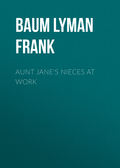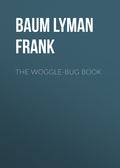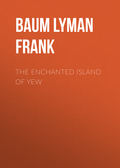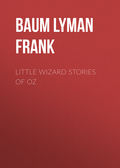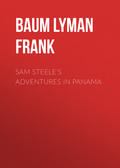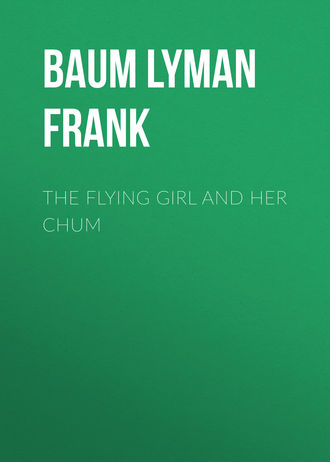
Лаймен Фрэнк Баум
The Flying Girl and Her Chum
CHAPTER XII
THE QUEST OF THE SALVADOR
On the roomy forward deck of the Salvador an earnest conference was held.
"How fast are we going?" asked Steve.
"The captain says about fifteen miles an hour. That's our best clip, it seems," replied Madeline.
"And very good speed," added Captain Krell, proudly.
"So it is, for an English yacht," agreed Mr. Cumberford.
"In that case," said Steve, "we are moving one-third as fast as the Aircraft did, and we were about two hours later in starting. Provided the girls exhaust their gasoline in flying, they will make a hundred and fifty to two hundred miles, requiring five or six hours' time. Then they will alight, bobbing upon the water and helpless to move in any direction except where the current carries them. It will take us eighteen hours to reach that same spot, and we will therefore be twelve hours behind them. Do you all follow me?"
They nodded, listening intently.
"Now, the girls left at about one thirty this afternoon. If my calculations are correct, they'll take to the water anywhere from six thirty to seven thirty this evening. We shall overtake them at about the same hour to-morrow morning. Unless they drift considerably out of their course we shall see the white planes at daybreak and have no trouble in running alongside. But there's always the chance that through some cause they may manage to drop to water sooner, and perhaps run the boat toward home. Orissa is a very clever girl, as you all know; calm and resourceful; quick-witted and brave. She will do all that anyone could do to bring the Aircraft under control. So the one danger, it appears to me, is that we may pass them during the night."
"That danger, sir," said Captain Krell, "may be reduced to a minimum. We carry a very powerful searchlight, which shall be worked by my men all night, illuminating not only the course ahead, but the sea for miles on every side. As you say, Mr. Kane, the white planes may be easily seen against the blue water, and we positively cannot miss them during the night."
"You – er – interest me," said Mr. Cumberford, looking more cheerful. "We seem to have everything in our favor, thanks to Miss Dentry's generosity."
"I'm so glad I bought this yacht!" exclaimed Madeline, fervently, "for it enabled me to go to the assistance of those poor girls. I'm sure it was all providential."
"Let us hope," said Mr. Tupper pompously, "the young women will survive until we reach them. However, we shall learn their fate, in any event, which will afford us a certain degree of satisfaction."
That speech was like a douche of cold water, but although the gentleman received various indignant and reproachful looks he had "sized up the situation" with fair accuracy.
Mr. Cumberford, however, since those first despairing moments on the aviation field, had recovered command of his feelings and seemed hopeful, if not confident, of his daughter's ultimate escape from serious mishap. He was exceedingly fond of Orissa, too, and even had not Sybil been with her it is certain that he would have been much worried and eager to go to her assistance.
Stephen Kane, on the contrary, grew more nervous as time passed. Better than the others he knew the dangers that threatened the girls if, as he suspected, the steering gear had broken and the elevator and engine control been rendered useless. He racked his brain to think what could have caused the trouble, but never a hint of the truth dawned upon him.
The third member of the Kane-Cumberford party, Mr. H. Chesterton Radley-Todd, had maintained a discreet silence ever since Miss Dentry had invited him to join the rescue party. This she had been led to do by the look of abject misery on the boy's face, and he had merely pressed her hand to indicate his thanks. Chesty Todd was never much of a conversationalist and his appreciation of his own awkwardness rendered him diffident unless occasion demanded prompt and aggressive action, when he usually came to the front in an efficient if unexpected manner.
Madeline Dentry, seeing Chesty Todd merely as he appeared, wondered in a casual way why such a blundering, incompetent booby had been employed by the Kane-Cumberford firm, but as the big boy was a part of the "camp" and was so evidently disturbed by the accident, she was glad to relieve him to the extent of adding him to the party.
Very soon after the Salvador started, however, nearly every one on board began to feel the presence of the youthful press agent. It was Chesty Todd who discovered the searchlight aboard and long before the conference on the deck he had primed the captain to use it during the coming night. It was Chesty Todd who sat on a coal-bunker in the hold, swinging his long legs and inspiring the engineer, by dark insinuations concerning the Salvador's ability to speed, to give her engines every pound of steam she could carry. It was Chesty who pumped the steward to learn how well the boat was provisioned and supplied the deck hands with choice cigars until they were ready to swear he was a trump and imagined him quite the most important personage aboard, after Miss Dentry.
The chef served an excellent dinner in the cabin, to which no one did full justice except Mr. Tupper. All were loth to leave the deck long enough to eat, although they knew a watch was stationed in the "crow's nest" with powerful glasses. When night fell the searchlight came into play and the entire party sat huddled forward, eagerly following the sweep of light across the waters. It was ten o'clock when Mr. and Mrs. Tupper retired, and midnight when Madeline went to her room, leaving orders to call her if the Aircraft was sighted.
Stephen Kane, Mr. Cumberford and Chesty Todd sat by the rail all night, wide-eyed and alert. Once the searchlight caught the sails of a ship and they all leaped up, thinking it was the Aircraft. Again, something dark – a tangled mass of wreckage – swept by them and set their hearts throbbing until they held the light steadily upon it and discovered it to be a jumble of kelp and driftwood. Daylight came and found them wan but still wakeful, for now they were getting close to the limit of flight possible to the Aircraft.
Captain Krell was a skillful navigator and, having taken his course in a direct line from Sealskin Island, following the flight of Orissa's Hydro-Aircraft, had not swerved a hair's breadth from it the entire voyage.
"You see," said Steve, peering ahead in the strengthening daylight, "the Salvador hasn't dodged a bit, and the Aircraft couldn't. So we're bound to strike our quarry soon."
"Wind," suggested Chesty.
"Yes; the wind might carry them a little out of their course, to be sure," admitted Steve; "but I think – I hope – not far enough to escape our range of vision."
At about seven o'clock, at Chesty Todd's suggestion, the engines were slowed down somewhat, that the lookout aloft might have better opportunity to examine the sea on all sides of the ship. The yacht still maintained fair speed, however, and the call to breakfast finding no one willing to respond, Madeline ordered coffee and rolls served on deck, where they could all watch while refreshing themselves.
"What's your run, Captain?" asked Steve, nervously.
"Hundred and forty miles, sir."
"Indeed! Go a little slower, please."
The captain rang the bell to slow down. Presently the Salvador was creeping along at the rate of ten miles an hour.
"The gasoline," said Steve, "may have carried them farther than I figured on. It's a new machine and I haven't had a chance to test the exact capacity of the tanks."
The moments dragged tediously. Every person aboard was laboring under tense excitement.
"What's the run, Captain?"
"One fifty-two, sir."
"Ah."
Nothing was in sight; only an uninterrupted stretch of blue sea. Hour after hour passed. At noon the run was two hundred and twenty miles and the aëroplane had not been sighted. Steve turned and faced those assembled.
"It's no use going farther in this direction," he said, the words trembling on his lips. "I'm very sure they couldn't have made this distance."
"Evidently their course has been altered by the wind," added Mr. Cumberford.
"Gusty, at times, last night," asserted Chesty.
Steve nodded.
"A strong wind might do what the girls couldn't," said he. "That is, it might alter the direction of their flight. How did it blow?"
"At four o'clock, from the north; at five fifteen, from the west; at six, due south," said Chesty.
There was silence for a few minutes. The engines had been shut down and the boat lay drifting upon the water.
"I think it will be well to examine the charts," suggested Mr. Todd, "and find out where we are."
"I know where we are," said Captain Krell. "Wait a moment; I'll get the chart, so you may all study it."
He brought it from his cabin and spread it upon a folding table on the deck. A penciled line ran directly from the port of San Diego to a point south by southwest.
"A few more hours on the same course and we'd sight the little island of Guadaloup, off the Mexican coast," explained Captain Krell. "But the aëroplane couldn't go so far; therefore we must search on either side the course we've come."
They all bent their heads over the map.
"What are those unmarked dots which are scattered around?" inquired Mr. Cumberford.
"Islands, sir. Mostly bits of rock jutting out of the sea. They're not important enough to name, nor do they appear on an ordinary map; but a seaman's chart indicates them, for unless we had knowledge of their whereabouts we might bump into them."
"They're mostly to the south of us, I see," remarked Mr. Tupper.
"Yes, sir."
"And it's south we must go, I think," said Steve, looking at Chesty Todd for the youth to confirm his judgment. "There was no wind to take them to the west of this course, I believe."
"That's my idea," declared the press agent. "I would suggest our doubling back and forth, on the return trip, covering forty or fifty miles at each leg. Seems like we couldn't miss 'em, that way."
After much consultation this plan was finally agreed upon. The captain outlined his course and followed it, so that during the next four days not a square yard of ocean escaped their search. But it was all in vain and at the end of the fourth day, with the California coast again in sight, there was scarcely a person aboard who entertained the slightest hope of finding the missing girls.
CHAPTER XIII
CAPRICIOUS FATE
A wireless was sent to the shore, reporting the failure of the Salvador to locate the runaway aëroplane and asking if any tidings had been received of Orissa Kane and Sybil Cumberford.
There was no news.
Madeline called her passengers together again for a further consultation.
"What shall we do?" she asked.
Neither Steve nor Mr. Cumberford could well reply. Miss Dentry had generously placed her splendid yacht at their disposal and in person had conducted the search, neglecting no detail that might contribute to their success. But failure had resulted and they could not ask her to continue what appeared to be a hopeless undertaking. Steve, who had had ample time to consider this finale, tried to answer her question.
"We are very grateful to you, Miss Dentry," he said, "and both Mr. Cumberford and I fully appreciate the sacrifice you have made in so promptly trying to rescue our girls. That we face failure is no fault of yours, nor of your crew, and I realize that you have already done all that humanity or friendship might require. Of course you understand that we cannot give up until my sister's fate, and that of Miss Cumberford, is positively determined. Therefore, as soon as we reach shore we shall organize another expedition to continue the quest."
"You are doing me an injustice, sir," returned the girl gravely. "Whatever my former plans may have been I am now determined not to abandon this voyage until we have found your sister and her companion. I was greatly attracted by Orissa Kane, and grieve over her sad fate sincerely. Moreover, I do not like to put my hand to the plow without completing the furrow. Unless you believe you can charter a better boat for your purpose than the Salvador, or can find a crew more devoted to your interests, I shall order Captain Krell to turn about and renew the search."
That, of course, settled the matter. The Salvador put about and returned to a point where the see-sawing must be renewed and extended to cover more expanse of ocean.
Chesty Todd, coming to where Madeline stood beside the rail, looked into her piquant face with frank admiration.
"Excuse me, Miss Dentry," said he, "but you're what I'd call a brick. I knew, of course, you'd stick it out, but there's no harm in congratulating a girl on being true blue. I'm awfully glad you – you had the grit to tackle it again. I'll never be myself again until those girls are found."
She looked up at him reflectively.
"Which of the young ladies are you engaged to?" she asked.
"Me?" blushing like a schoolboy; "neither one, if you please. They – they're only kids, you know."
"Then which one do you love?"
"Both!" said Chesty Todd, earnestly. "They're splendid girls, Miss Dentry; your sort, you know."
She smiled.
"Then it's the 'sort' you love?" she asked.
"Yes, if you'll allow me. Not the individual – as yet. When I love the individual I hope it'll be the right sort, but I'm so humbly unlucky I'll probably make a mistake."
For the first time since their acquaintance Madeline found the big boy interesting. She knew very little of the history of the Kanes and Cumberfords, but found Chesty eager to speak of them and of his past relations with them, being loud in his praise for the entire "combination." Cumberford was an eccentric fellow, according to Mr. Radley-Todd, but "straight as a die." Steve was chock full of ability and talent, but not very practical in business ways. Mrs. Kane, Orissa's blind mother, was the sweetest and gentlest lady in the world, Sybil Cumberford a delightful mystery that defied fathoming but constantly allured one to the attempt, while Orissa —
"Orissa Kane is a girl you'll have to read yourself, Miss Dentry, and the more you study her the better you'll love her. She's girl all over, and the kind of girl one always hopes to meet but seldom does. Old-fashioned in her gentleness, simplicity, truth and candor; up-to-the-minute in the world's latest discovery – the art of flying. Modest as Tennyson's dairymaid; brave as a trooper; a maid with a true maid's heart and a thorough sport when you give her an aëroplane to manage. Excuse me. I don't often talk this way; usually I can only express myself in writing. But a fellow who wouldn't enthuse over Orissa Kane could only have one excuse – total dumbness."
"I see," said Madeline, slyly. "Miss Kane is the type of the 'sort' of girl you love."
"Exactly. But tell me, since you've started on such an indefinite cruise, is the Salvador well provisioned?"
"From the sublime to the ridiculous! We have stores to last our party six weeks, without scrimping."
"Good. And coal?"
"Enough for a month's continuous run. I had intended a trip to Honolulu – perhaps as far as Japan – and had prepared for it even before I was privileged to lay eyes on my yacht."
"How fortunate that was, for all of us! Somehow, I've a feeling we shall find those girls, this time. Before, I had a sort of hunch we were destined to fail. Can you explain that?"
"I shall not try."
"We didn't allow enough for the wind. A sudden gust might have whirled the Aircraft in any direction, and it would jog along on that route until the next blow."
"Do you believe they are still alive?" she asked softly.
"Yes; I've never been able to think of them as – as – otherwise. They are wonderfully clever girls, and Orissa knows aëroplanes backwards and forwards. She's as much at home in the air as a bird; and why shouldn't the machine fall gently to the water, when the gasoline gave out? If it did, they can float any length of time, and the Pacific has been like a mill pond ever since they started. According to Mr. Cumberford, they have enough food with them to last for several days. I've an idea we shall run across them bobbing up and down on the water, as happy and contented as two babes in the wood." The big fellow sighed as he said this, and Madeline understood he was trying to encourage himself, as well as her.
In spite of Chesty Todd's prediction, day followed day in weary search and the lost aëroplane was not sighted. Captain and crew had now abandoned hope and performed their duties in a perfunctory way. Stephen Kane had grown thin and pale and deep lines of grief marked his boyish face. Mr. Cumberford was silent and stern. He paced the deck constantly but avoided conversation with Steve. Madeline, however, kept up bravely, and so did Chesty Todd. They were much together, these trying days, and did much to cheer one another's spirits. Had a vote been taken, on that tenth dreary day, none but these two would have declared in favor of prolonging what now appeared to be a hopeless quest.
"You see," said Chesty to Madeline, yet loud enough to be heard by both Cumberford and Steve, "there's every chance of the girls having drifted to some island, where of course they'd find food in plenty; or they may have been picked up by some ship on a long voyage, and we'll hear of 'em from some foreign port. There are lots of ways, even on this trackless waste, of their being rescued."
This suggestion was made to counteract the grim certainty that the castaways had by now succumbed to starvation, if they still remained afloat. Several small islands had already been encountered and closely scanned, with the idea that the girls might have sought refuge on one of them. The main thing that kept alive the spark of hope was the fact that no vestige of the Aircraft had been seen. It would float indefinitely, whether wrecked or not, for the boat had enough air-tight compartments to sustain it even in a high sea.
On the evening of this tenth day the Salvador experienced the first rough weather of the trip. The day had been sultry and oppressive and toward sundown the sky suddenly darkened and a stiff breeze caught them. By midnight it was blowing a hurricane and even the sturdy captain began to have fears for the safety of the yacht.
There was little danger to the stout craft from wind or waves, but the sea in this neighborhood was treacherous and full of those rocky islets so much dreaded by mariners. Captain Krell studied his chart constantly and kept a sharp lookout ahead; but in such a night, on a practically unknown sea, there was bound to be a certain degree of peril.
There was as little sleep for the passengers as for the crew on this eventful night. The women had been warned not to venture on deck, where it was dangerous even for the men; but Madeline Dentry would not stay below. She seemed to delight in defying the rage of the elements. Clinging to the arm of Chesty Todd, the huge bulk of whose six-feet-three stood solid as a monument, she peered through the night and followed the glare of the searchlight, now doubly useful, for it showed the pilot a clear sea ahead.
Mr. Tupper bumped into them, embraced Chesty for support and then bounded to the rail, to which he clung desperately.
"Why are you on deck?" asked Madeline, sternly. "Go below at once!"
Just then a roll of the yacht slid him across the deck, tumbled him against the poop and then carried him sprawling into the scuppers. When he recovered his breath Mr. Tupper crawled cautiously to the companionway and disappeared into the cabin.
Steve and Mr. Cumberford had lashed themselves to the rail and in spite of the drenching spray continued to peer into the wild night with fearful intensity. Both were sick at heart, for they knew if the girls had managed to survive till now, their tiny boat would be unable to weather the storm. Every shriek of the wind, which often resembled a human cry, set them shivering with terror.
It was toward morning when the glare of the searchlight suddenly revealed a dark peak just ahead. Stephen Kane and Mr. Cumberford saw it, even as the warning scream of the lookout rang in their ears. Captain Krell saw it, and marveling at its nearness, sprang to the wheel. Madeline and Chesty saw it, too, and instinctively the big fellow put his arms around her as if to shield her.
Wild cries resounded from the deck; the bells rang frantically; the engines stopped short and then reversed just as a huge wave came from behind, caught the Salvador on its crest and swept her forward in its onward rush. Two men threw their weight upon the wheel without effect: the propeller was raised by the wave above the water line and whirred and raced madly in the air, while beneath the gleam of the searchlight a monstrous mass of rock seemed swiftly advancing to meet the fated ship.
Past the port side, where Madeline and her escort clung, swept a jagged point of rock; the yacht bumped with a force that sent everyone aboard reeling forward in a struggling heap; then it trembled, moaned despairingly and lay still, while the wave that had carried it to its doom flooded the decks with tons of water and receded to gloat over the mischief it had caused.
The searchlight was out; blackness surrounded the bruised and bewildered men and women who struggled to regain their feet, while in their ears echoed a chorus of terrifying shrieks not of the wind, but so evidently emanating from living creatures that they added materially to the panic of the moment.
Chesty Todd released Madeline, gasping and half drowned, from the tangle of humanity in the bow, and succeeded in getting her to the rail. The bow of the yacht was high and it lay over on one side, so that the deck was at a difficult angle.
"Are – are we sinking?" asked the girl, confused and unnerved by the calamity.
"No, indeed," replied Chesty, his mouth to her ear. "We can't sink, now, for we're on solid ground and lying as still as a stuffed giraffe."
"Oh, what shall we do?" she cried, wringing her hands. "If we are wrecked we can't save Orissa – perhaps we can't save ourselves! Oh, what shall we do? – what shall we do?"
The boy saw that the shock had destroyed her usual poise and he could feel her trembling as she clung to him.
"My advice," he said quietly, "is that we all get to bed and have a wink of sleep. It has been a long and exciting day for us, hasn't it?"



